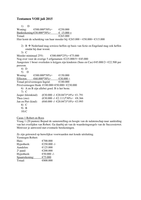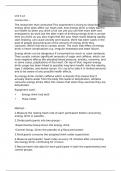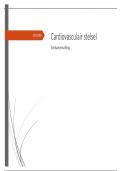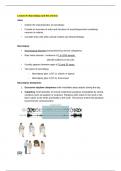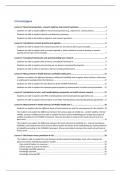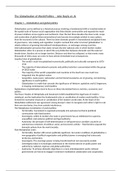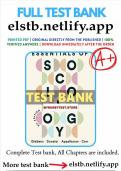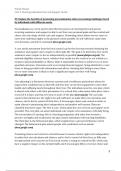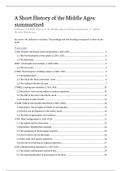Stress = a condition/feeling experienced when a person perceives that demands exceed the personal
and social resources the individual is able to mobilize.
Stress = constellation of events, consisting of a stimulus (stressor) that precipitates a reaction to the
brain (stress perception) that activates physiological fight or flight systems in the body (stress
response). Stressors are anything that disrupt homeostasis (=body’s ideal base levels)
Therefore, stress is—originally—an adaptive response!
o Adaptive: acute; short duration; fast recovery after stressor has passed; signals
danger & prepares body for it
o Disruptive: chronic; long duration; slow recovery; early onset; not signaling/preparing
the body for anything
Ancient history: acute physical risk or chronic physical risk. New: psychological crisis, social
crisis, prolonged psychological stress. And stress influences health
o Stress health
o Stress psych. Problems health
o Stress psych. Problems behavioral components health
Makes people sick without having disease, increases odds for development of mental health
and physical health problems. Also negatively affects recovery after disease or injury, effects
of medical interventions, and patient-physician communication (forgetting info).
Short term stress Long term stress
Positive consequences Increase of immunoprotection; ((Possibly suppresses auto-
Enhancement of mental & immune disease symptoms))
physical performance
Generally just bad
Negative consequences Emotion: negative mood; Auto-immune disease;
Cognition: concentration & Cardiovascular disease;
memory; Cancer
Behaviour: smoking, drinking;
Biological: immune, endocrine
The body during stress
Charles Darwin (1809-1892): organisms capable of adapting to changing environment will survive
(ability to cope with stressful changes)
Claude Bernard (1813-1878): Mileu interieur (inner environment should be stable to cope better)
Walter B. Cannon (1871-1945): Fight or flight response (in danger, body prepares to fight or flight due
to NT’s norepinephrine and epinephrine)
Autonomic nervous system (ANS): works on its own, has parasympathetic (rest and digest) and
sympathetic (fight or flight) nervous systems.
The nervous system communicates through neurotransmitters (short distances, via central nervous
system (CNS)) and hormones (longer distances, via endocrine system). These interact with each
other. Signaling:
CNS sympathetic adrenomedullary system (SAM) norepinephrine & epinephrine
Hypothalamus pituitary gland adrenal gland (HPA-axis) glucocorticoids
o Cortisol, steroids, estrogens, progestins
, SAM is activated first, followed by the HPA axis a few minutes later. Other responses to stress:
Hormonal activation
o Pancreas produces glucagon to mobilize energy (body = preparing for action)
o Pituitary produces prolactin (not useful to reproduce during stress)
o Pituitary produces vasopressin, increasing blood pressure (becoming more alert)
o Pituitary & brain produce endorphins/enkephalins (natural pain killers)
Hormonal inhibition
o Reproductive hormones (estrogen, testosterone)
o Growth hormones (insulin, so energy doesn’t get stored but stays available)
Hans Selye added glucocorticoids to the existing theoretical basis of the stress response. He also
introduced the General adaptation syndrome (GAS), as he noticed every stressful situation leaves a
mark. Says stress is a physiological response. It’s something we can measure
GAS stage Details Symptoms
Alarm/action stage First encounter with stressor. Increased energy
Fight or flight response Takotsubo syndrome
High adrenaline and activation
Resistance stage Body in constant battle with stressor. Irritability
High cortisol Frustration
Stress becomes chronic, can’t restore Poor concentration
energy; move on to exhaustion
Exhaustion stage Developing health problems Fatigue
Burnout
Anxiety/depression
Physical problems
The reactivity hypothesis poses our stress response is always adaptive; stress response is activated
closely before stressor, and physiological response goes down when the stressor passes (recovery
back to baseline).
Views from psychology
J. W. Mason: reaction to stress varies between and within individuals (even when considering
the same stressor) (time). It’s also not always that straightforward: can’t always be predicted
how the stress response will act.
S. R. Burchfield: there might be evidence that adapting to stressor is a psychological problem
rather than a physiological one.
o Psychology is more important in knowing whether a stressor will be harmful to health
or not.
Prolonged activation model: stressor affects our health when the physiological effect is
prolonged (early onset of anticipated stress + slow recovery of stressor)
Michigan stress model (Kahn et al.): not only the objective stressor and our subjective
perception that decide if stress has an effect on our health or not
o Harm by stressor also influenced by personality, social support, and reaction to
stressor
Conclusions: stress response is not purely physiological; not everyone has the same stress response;
stress response & its duration differ within and between people.
If we want full image of what stress is, focus on both psychological & biological responses
o Resting ground phase, tension phase, response phase, relief phase
o Frequency, duration, intensity
, Stress response activation
Happens when homeostasis is disrupted, can be anticipated. Can be adaptive, but also unnecessary.
Can be acute & long term; both have negative effects on health, but acute can also have positive
effects.
Differences in stress response can be
o Individual (perception, processing, appraisal, coping, genetic makeup)
E.g.: stress might be lower if you think you can deal with the situation
o Situational (elicitation of different biological responses)
o Gender-based
Men experience more of the activated state in the fight/flight response
Women tend to activate the tend and befriend system more
Taking care of others; seeking social affiliation; belonging to a group;
release of oxytocin (evolutionary; in case of danger it was more
logical to form groups & care for children rather than fighting)
Stress response can be damaged: inability to turn it on/off (appropriately): either no stress response,
chronic stress, or stress response unrelated to stressor presence.
Historical perspectives on coping
The Gating mechanism (Norwegian experiment): study where people had to jump 12m high,
11 days in a row.
o Physiological response increased until day 4, then started going down. On day 11,
almost reached baseline level as prior to day 1: habituation occurred
o Conclusion: to deal with stress effectively, perform the situation very often
The dichotomy model (Lazarus): ‘it’s all about our perception’
o Perceiving stressor as threat more emotional response more physiological
o Perceiving stressor as stressor more logical response less physiological
Transactional model of stress: stress response consists of 2 appraisals
o First appraisal after event: threat/non-threat
o Second appraisal, after perceived threat: ability to cope with the situation
Perceived ability to cope with the situation: positive stress
Perceived non-ability to cope with the situation: negative stress
LECTURE 2
There are a lot of stress-related diseases, which have high prevalence (e.g.: 13% of males and 13.9%
of females report burn-out symptoms, and 500.000 Dutch people have had PTSD symptoms). By
understanding underlying stress mechanisms, we can treat these diseases more efficiently.
Stress theories
1) Environmental perspective
Focus on assessment of environmental events/experiences that are normatively associated
with substantial adaptive demands everything happening outside of individual might
cause stress
Holmes & Rahe among the first to acknowledge the importance of this. Created a scale to
summarize environmental stressors (positive (vacation) & negative (divorce))
o Defined social readjustment as the intensity & length of time necessary to
accommodate to a life event
o Many events can be perceived as stressful, some more than others.
o Summed up all different events a person experienced and added up values
Scores over 300 points raises the odds about 80% to become physically ill


